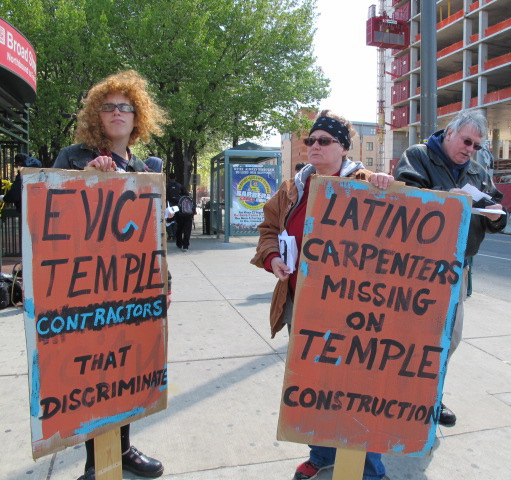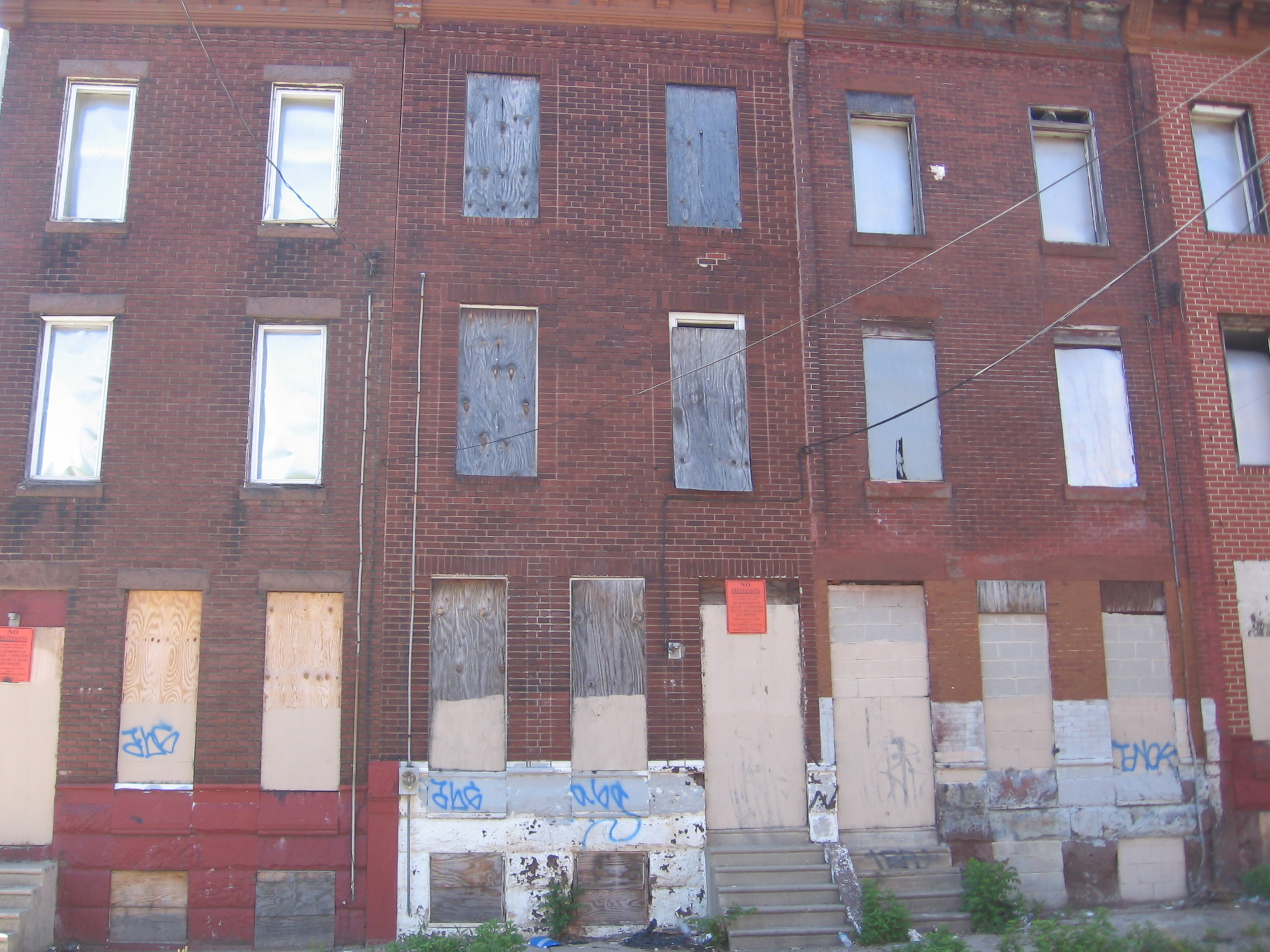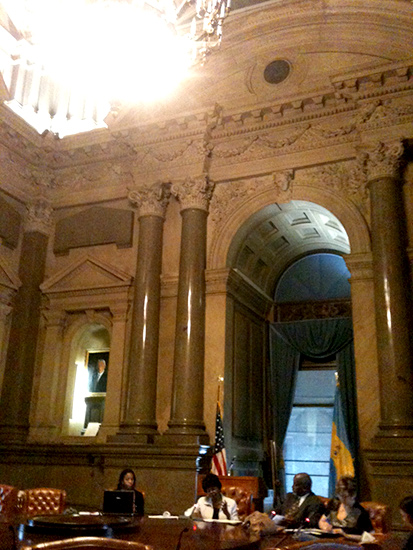New Economic Opportunity Review Committee holds first meeting
City Council’s Economic Opportunity Review Committee held its first-ever hearing in Council’s Caucus Room Monday morning, outlining its mission and hearing testimony from members of the public. The Committee is charged with reviewing the effectiveness of Economic Opportunity Plan legislation and making recommendations for its improvement to City Council.
The meeting began with a quorum of two: committee chair Angela Dowd-Burton, director of the Office of Economic Opportunity, and Steven Scott Bradley, Chairman of the tri-state African-American Chamber of Commerce. They were joined later by Varsovia Fernandez, head of Philadelphia’s Hispanic Chamber of Commerce, and Judy Hoover, legislative director of AFSCME District Council 47. District Council 33 President Peter Matthews is listed as a Committee member, but did not attend Monday’s meeting.
Dowd-Burton provided an overview of the work of the Office of Economic Opportunity and described the new Committee’s area of concern, which is Chapter 17-1600 of the Philadelphia Code, “Economic Opportunity Plans.”
The contents of that chapter are briefly summarized below:
- An Economic Opportunity Plan (EOP) is required for any development project anticipated to exceed $250,000 which is City-funded, gets a grant of financial assistance, or requires action from the Zoning Board of Adjustment, to name a few of the triggers.
- The Plan is intended to reflect a commitment on the part of the contractor, developer, or recipient of financial assistance to provide ample opportunities for Minority, Women, or Disabled Owned Business Enterprises (M/W/DSBEs) to participate in the project, as subcontractors or otherwise.
- The EOP chapter does not contain required minority participation quotas; it merely describes the process a developer must go through to provide opportunities for that participation.
- EOPs are developed by contracting and certifying agencies (such as the Office of Economic Opportunity), members of City Council, and the contractor, developer, or recipient of financial assistance.
- Affected developers must agree to an oversight process which consists of periodic meetings with the Oversight Committee that developed the EOP.
- The Oversight Committee may find that a contractor is not meeting the requirements of the EOP, and mete out penalties in the form of withheld payments, contract termination, suspension from bidding for City contracts, or recovering liquidated damages.
The final section of the EOP chapter deals with the mission and membership of the Economic Opportunity Review Committee itself. The Committee was established earlier this year through a bill introduced by At-Large Councilman Wilson Goode, Jr.
As suggested above, the Committee’s purpose is “to review the implementation, effectiveness and enforcement of [chapter 17-1600] and to make recommendations to Council regarding the adoption of resolutions calling for debarment of certain contractors and recipients of City financial assistance …”
It is structured as a five-member committee that holds public meetings “at least quarterly.”
Councilman Goode said that the Chambers of Commerce represented on the Committee were chosen because of their roles as non-profit “advocates for inclusion” which can’t be accused of having any conflicts of interest.
“I chose organizations that I believe are familiar with the City’s contracting process but did not have a direct interest” in any individual contract, Goode said.
Goode said he felt the Committee’s first meeting was productive in getting its members up to speed on their responsibilities and giving members of the public an opportunity to testify.
“The real key part of this,” Goode said, “is taking public testimony and responding to people who have their eyes and ears out their looking at the implementation [of EOPs].”
Six witnesses testified at Monday’s hearing, all of whom wanted to see an improvement in the enforcement of Economic Opportunity Plans and, more generally, minority participation in construction projects.
“The Office of Economic Opportunity is not enforcing the paperwork that the contractors are signing to get the jobs,” said John Graves, a member of the Fair Hiring Coalition who has participated in protests decrying a lack of minority participation in development at Temple University.
“Because they’re not enforcing [EOPs],” Graves continued, “the contractors are allowed to get away with what’s going on in the City, and you’ve got jobs like Temple University, where you have a problem with diversity in the middle of North Philadelphia.”
Jihad Ali, director of Philadelphia’s chapter of the National Association of Minority Contractors, criticized the Committee for starting its first hearing late, and with only two members. In his testimony, Ali said, “in any committee, members have a responsibility to participate and be informed.” Both Judy Hoover and Varsovia Fernandez later apologized for being late to the hearing.
“I’d like [the Committee] to do what Council gave them the authority to do,” Ali told PlanPhilly, “which is to bring about change, look at the effectiveness of the Committee, recommend debarment for contractors, and to see exactly how we can improve the process that’s clearly been there for years.”
Joanna Harris, owner of A.R.B. Construction Inc., questioned why the City still has minority contracting issues in 2012, after decades of fair employment legislation.
“This agenda from this committee and from City Council needs to be aggressive,” Harris said.
Harris said she would push the Committee to recommend debarment for contractors that don’t comply with Economic Opportunity Plans by naming them at future meetings.
Angela Dowd-Burton, the Committee chair, said the Committee’s first priority is encouraging and acting on public testimony.
“I think [the first meeting] was productive,” Dowd-Burton said. “The ultimate goal was to make sure that everyone starts with a baseline of information about the mission of this committee, about how the Office of Economic Opportunity drives the current results through the Economic Opportunity Plan process, and communicating to the public our interest in working with them, collaboratively, to identify improvements that we can recommend for legislation. And also providing them with a forum to give us feedback on the construction industry, and what they’re seeing, what their experiences are, and how we can assist them to assure economic inclusion and workforce diversity.”
The next Economic Opportunity Review Committee meeting will be September 12, at 10 a.m., in the City Council Caucus Room.
Contact the reporter at jaredbrey@gmail.com and follow him on Twitter @jaredbrey
WHYY is your source for fact-based, in-depth journalism and information. As a nonprofit organization, we rely on financial support from readers like you. Please give today.






